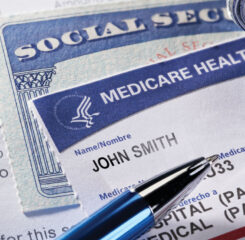CDC Holds Series of Calls on Pfizer COVID-19 Vaccine
CDC held 2 calls over the weekend to provide updates on the COVID-19 vaccine from Pfizer. The call on December 12 was specific to health departments. The December 13 call was specific to healthcare providers and the presentation is available here. A CDC Clinician Outreach and Communication Activity (COCA) webinar was held on Monday, December 14 to discuss vaccine adverse event reporting and post-vaccine infection control considerations. This presentation is available here.
Of note to our members:
- Clinical guidance is forthcoming. We will share when the guidance is formally posted.
- Communications toolkit for longterm care facilities coming soon from CDC. Check back here often.
- What about informed consent? The federal government cannot require informed consent under an Emergency Use Authorization (EUA). However, FDA requires that anyone receiving the vaccine is provided with the vaccine EUA fact sheet. It is strongly recommended that receipt of the vaccine EUA fact sheet be documented in each patient’s records. There will also be informed consentlike materials in the LTC facility toolkit that CDC anticipates releasing by next week. Providers can adapt these materials for use.
- Infection prevention and control recommendations for persons with post vaccination symptoms are now available here. CDC has provided postvaccine considerations for residents and postvaccine considerations for healthcare personnel.
- FDA is developing an algorithm for the triage of persons presenting for the vaccine. This will be posted shortly. Contraindications do not include people with allergies to environmental allergens, oral medications, or family history or anaphylaxis. Those people can proceed with vaccination. Additional details are summarized below.
Basics of the Vaccine: Pfizer COVID-19 Vaccine received EUA on December 13 for individuals aged 16 years and older.
The Pfizer vaccine is an mRNA vaccine. mRNA takes advantage of the process that cells use to make proteins in order to trigger an immune response. The safety and efficacy of the vaccine has been rigorously tested through 3 phases of clinical trials. This vaccine is the first to use this technology, but the technology has been studied for more than a decade. The vaccine does not contain a live virus, making it safer to produce and administer. Also, mRNA from the vaccine does not enter the cell and will not alter DNA.
Overview of ACIP Recommendations
The Advisory Committee on Immunization Practices (ACIP) recommends that when a vaccine is authorized by FDA and recommended by ACIP, health care personnel and residents of long-term care be offered vaccination in the initial phase.
Vaccine Administration
The Pfizer vaccine is a 2-dose vaccine with the 2 doses being administered 3 weeks apart. The second dose should be administered between days 17 and 21. If the second dose is not administered by Day 21, it should be administered as soon as possible, but the first dose should not be repeated. The efficacy of a single dose has not been evaluated. The Pfizer vaccine is not interchangeable with other vaccine products. If an individual receives a first dose of the Pfizer vaccine, the second dose must also be the Pfizer vaccine. The safety of a mixed product has not been evaluated. If an individual is mistakenly given 2 doses from different vaccines, no additional doses of either vaccine is recommended. Additionally, the Pfizer vaccine should be administered alone with a minimum interval of 14 days before or after the administration of other vaccines.
Vaccination of Special Populations
Persons with underlying medical conditions: The Pfizer vaccine may be administered to those with underlying medical conditions who have no contraindications to vaccination, including those with increased risk of COVID-19.
Persons with HIV infection or those taking immunosuppression medications: These individuals might be at increased risk for COVID-19. They may still receive the Pfizer vaccine, but should be counseled about the unknown risk profile of the vaccine.
Pregnant women: There is no data on the safety of the Pfizer vaccine in pregnant women. Animal studies are underway. Studies in humans are ongoing and planned. Recall that mRNA do not enter the nucleus of the cell. If a pregnant woman is part of a group who is recommended to be vaccinated, she can choose to be vaccinated. Pregnant women and providers should consider the level of community transmission, the risks to her and potential risks to the fetus, the efficacy of the vaccine, the known side effects of the vaccine, and the lack of data about the vaccine during pregnancy. Routine pregnancy testing is not recommended prior to administering the vaccine.
Breastfeeding women: There is no data on the safety of the Pfizer vaccine in lactating women or the effects on the breastfed infant. If a woman is breastfeeding and in a group recommended to be vaccinated, she may choose to be vaccinated.
Current guidance for pregnant and breastfeeding women was agreed on in partnership with American College of Obstetricians and Gynecologists and American Academy of Pediatrics. CDC states that theoretically, there is not a risk, and so recommends that pregnant women be offered the option of vaccination.
Patient Vaccine Counseling
Prior to administering the vaccine, providers should counsel on local and systemic post-vaccination symptoms. Unless a person develops a contraindication, they should be encouraged to complete the vaccine series. Antipyretic or analgesic medications may be taken for treatment of post vaccine symptoms. Two doses are required to receive high efficacy. Public health recommendations state that a person will be considered vaccinated 1-2 weeks following the second dose. Recall that no vaccine is 100% effective. Given the currently limited data, vaccinated persons should continue to follow all COVID-19 guidance, including masking, social distancing, and practicing hand hygiene.
Precautions
Severe allergic reaction to any component of the vaccine is a contraindication to the vaccine. Appropriate medical treatment used to manage allergic reactions must be immediately available in the event of such a reaction. Those who have a history of an allergic reaction to a vaccine or other injectable must be observed for 30 minutes following vaccine administration. All others receiving the vaccine, including those who have no history of an allergic reaction to a vaccine or injectable, must be observed for 15 minutes following vaccine administration.
Questions and Answers:
Will receiving the vaccine change someone’s PCR or POC test results? Prior receipt of the vaccine will not affect results of viral testing (PCR or antigen tests). A positive viral test should be evaluated as a positive result regardless of vaccination status. Antibody tests may be affected. A positive antibody test could indicate either vaccination or prior infection.
Should someone who previously had COVID infection be vaccinated? Yes. Vaccine should be offered to persons regardless of history of prior symptomatic or asymptomatic COVID-19. Data from phase 2-3 clinical trials suggest it is still efficacious.
Should someone who has a current COVID infection be vaccinated? Vaccination should be deferred until recovery from acute illness. That is, individuals may be vaccinated once they meet criteria for discontinuation of transmission-based precautions. There is no recommended minimal interval between infection and vaccination. Persons with documented acute infection in the preceding 90 days may defer vaccination until the end of the 90-day period if desired. However, this practice is not recommended for those in the long-term care setting.
Should someone who received plasma or monoclonal antibody treatment receive the vaccine? There is no data on safety or efficacy in combination with other treatments. Vaccination should be deferred to at least 90 days after the treatment to avoid potential interference.
Should those with a known exposure to COVID-19 be vaccinated? People in the general community who have a known COVID-19 exposure should not seek vaccine until quarantine has ended in order to prevent exposing healthcare personnel and others. In long-term care, however, healthcare personnel and residents with a known COVID exposure may be vaccinated before the quarantine period is up. In these circumstances, employ appropriate safety protocols in vaccine administration. Those in other congregate settings who have been exposed, such as correctional facilities or homeless shelters, may also be vaccinated without waiting for the end of a quarantine period.
Should those with a history of extreme anaphylaxis to non-medications be vaccinated? Yes, individuals who have a history of extreme anaphylaxis to non-medications may be vaccinated. No contraindications or precautions have been issued for extreme anaphylaxis that was not related to a vaccine or an injectable, such as anaphylaxis due to latex, pollen, animal, and food allergies. Cautions relate to those who have had anaphylaxis to any vaccine or injectable. This means that those individuals should have a discussion with the provider to understand what may have happened, understand what the reaction was really caused by, was it a severe allergic reaction, etc. These individuals can still get the vaccine but should be counseled on the unknown risks of the vaccine. A 30-minute post-vaccine observation period is recommended for those with a previous reaction to a vaccine or injectable.
What if someone had a previous anaphylaxis to an ingredient of the COVID-19 vaccine? Can they get the vaccine? They should not be given the vaccine. A potential source of allergic reaction is the ingredient poly ethaline glycol (PEG). This ingredient is present in some other injectable medications. CDC notes that there is an abundance of caution around this question and it is not intended that people who have had mild allergic reactions should be concerned about being vaccinated. The 2 cases of anaphylaxis related to this vaccine were experienced by individuals who had experienced severe anaphylaxis to a vaccine in the past. There were no cases of anaphylaxis in the clinical trial.
Does this vaccine protect against transmission? This vaccine was evaluated to see if it protected individuals from the virus itself. We do know this vaccine is very good at keeping you from getting the virus. Transmission of the virus to others was not previously evaluated. For this reason, guidance on masks, washing hands, and social distancing will continue even after vaccination. Guidance for quarantine will also continue, even for those who are vaccinated. Over the next several weeks, transmission will be evaluated. Pfizer stated during the FDA advisory board meeting that they would be doing this type of study. This involves taking vaccinated persons and doing nasal swabs regularly. We expect to know more in the coming weeks and months. Guidance will change as needed when there is more information to inform clinical guidance.
How do you recommend increasing vaccine confidence in healthcare workers? CDC is aware that there is a lot of hesitancy around this vaccine. That is part of the reason for the outreach calls they have held—to explain how these vaccines work, and how safety is monitored. Healthcare providers are one of the key ways to increase vaccine confidence. CDC theorizes that if healthcare providers are vaccinated, they can talk about the vaccine with confidence and increase confidence for the entire population.
What about informed consent? It is strongly recommended that receipt of the vaccine fact sheet be documented in patient records. Informed consent-like materials will be available in long-term care facility toolkit that CDC anticipates releasing next week. Providers can use and adapt these materials to document resident consent to the vaccine.
After getting vaccinated or giving the vaccine are there any requirements for follow up? Requirements under the EUA include:
- All patients receive the patient fact sheet that Pfizer has available online.
- All patients are provided a vaccine shot card.
- All vaccinations given are reported to the vaccine registry. Knowing which product someone received is critical to ensure they receive the same product in the second dose.
- If a patient has an adverse event, it is required to report to the vaccine adverse event reporting system (VAERS).

Most Recommended
October 15, 2025
 Shutdown Week Three: Impact of Ongoing Closure on Affordable Housing
Shutdown Week Three: Impact of Ongoing Closure on Affordable Housing
February 24, 2026
Fiscal Year (FY) Funding 2026
October 07, 2025
Immigrant Workforce Matching Program Brings Workforce Relief
Recently Added
February 26, 2026
 Vance, Oz Announce Medicaid Funding Withheld From Minnesota
Vance, Oz Announce Medicaid Funding Withheld From Minnesota
February 25, 2026
CBO: HR 1 Speeds Medicare Part A Insolvency by 12 Years
February 24, 2026
DHS Proposes Asylum-Related Work Authorization Change
February 20, 2026



